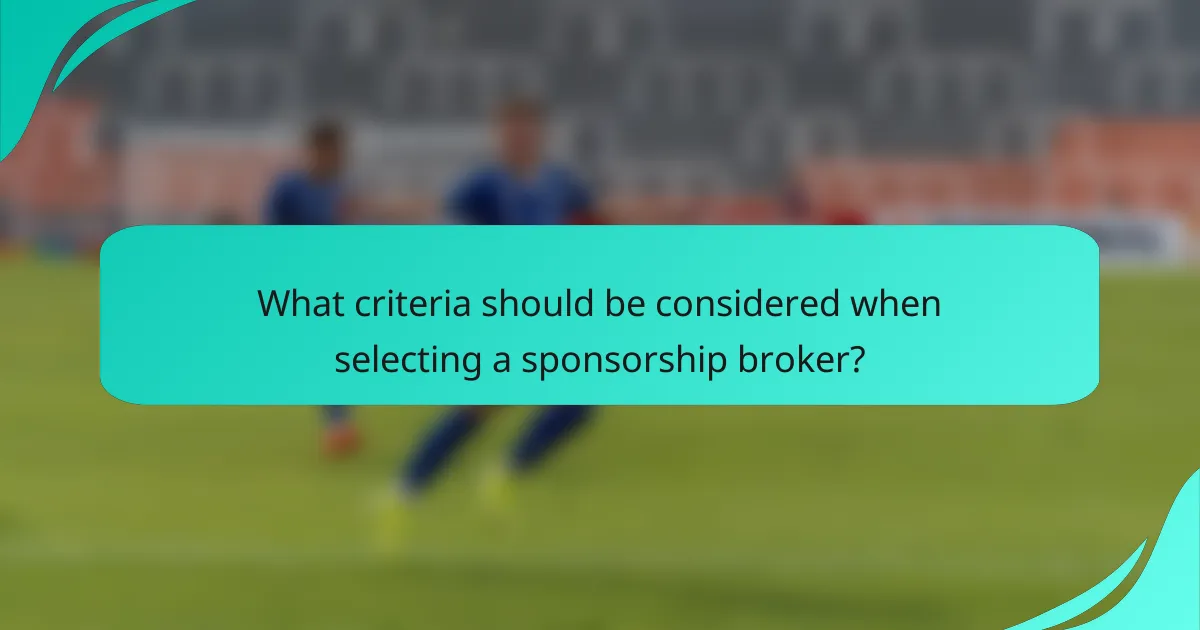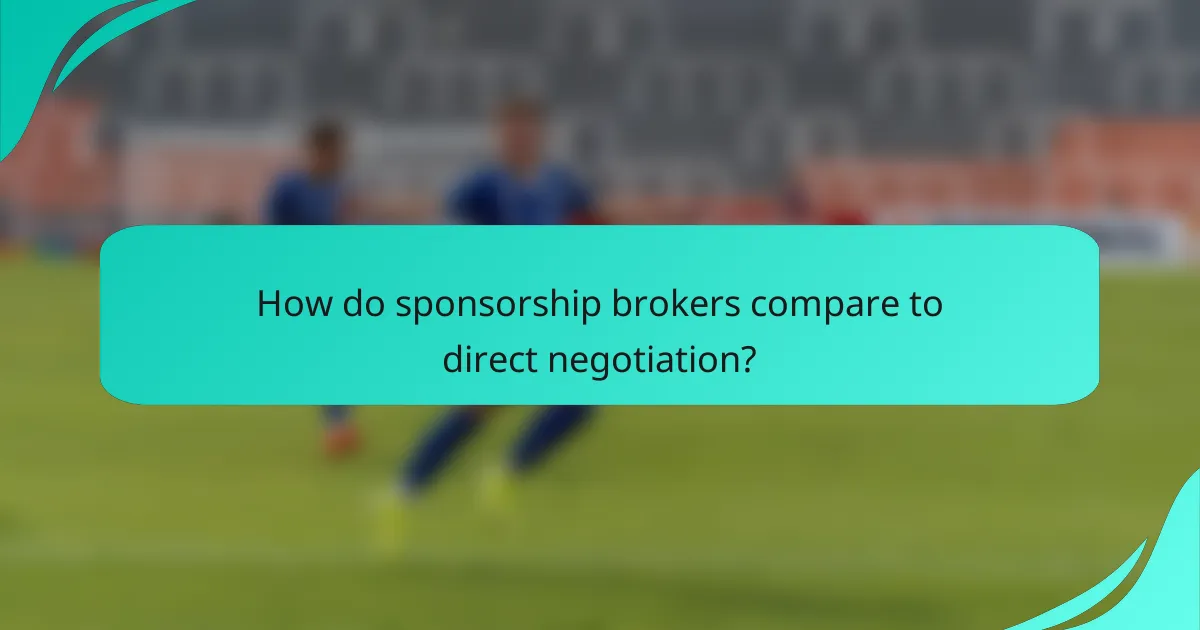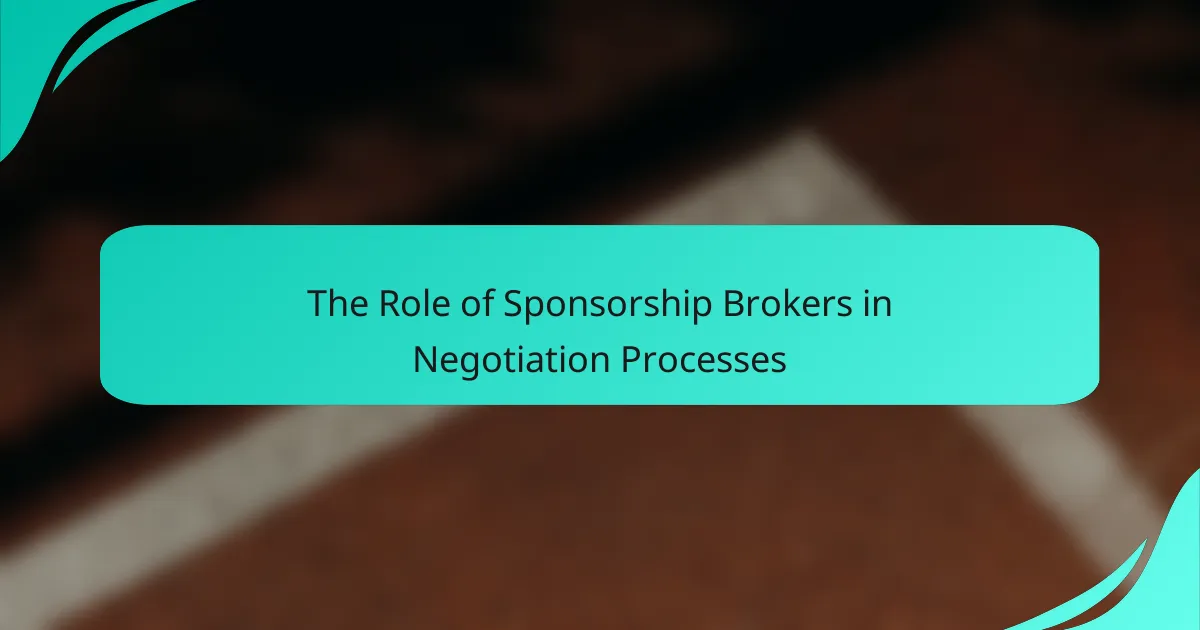Sponsorship brokers are essential intermediaries in the negotiation process, utilizing their industry expertise and extensive networks to connect brands with suitable sponsorship opportunities. By streamlining negotiations, they help ensure that both sponsors and properties reach favorable agreements that maximize value for all parties involved.

How do sponsorship brokers facilitate negotiations in the UK?
Sponsorship brokers play a crucial role in facilitating negotiations by leveraging their expertise and networks to connect brands with sponsorship opportunities. They streamline the negotiation process, ensuring that both parties achieve mutually beneficial agreements.
Expertise in deal structuring
Sponsorship brokers possess specialized knowledge in deal structuring, which is essential for creating agreements that align with both the sponsor’s and the property’s objectives. They understand the nuances of various sponsorship types, such as event sponsorships, team partnerships, and digital activations.
By analyzing market trends and past deals, brokers can propose structures that maximize value for their clients. This includes determining the right mix of cash and in-kind contributions, which can vary significantly based on the sponsorship’s scope.
Access to exclusive sponsorship opportunities
One of the key advantages of working with sponsorship brokers is their access to exclusive sponsorship opportunities that may not be available to the general public. Brokers often have established relationships with rights holders, enabling them to negotiate deals that are not widely advertised.
This insider access can lead to unique partnerships that enhance brand visibility and engagement. For example, a broker might secure a sponsorship for a high-profile sporting event or a popular cultural festival, providing significant exposure for the brand.
Negotiation strategy development
Sponsorship brokers develop tailored negotiation strategies that reflect the specific goals and constraints of their clients. They assess the strengths and weaknesses of both parties to craft a compelling case that supports their client’s position during negotiations.
Effective strategies may include identifying key leverage points, such as audience demographics or brand alignment, which can be highlighted to strengthen the negotiation stance. Brokers also prepare their clients for potential counteroffers and objections, ensuring they are well-equipped to respond effectively.
Conflict resolution support
During negotiations, conflicts may arise due to differing expectations or misunderstandings. Sponsorship brokers provide valuable conflict resolution support by acting as intermediaries who facilitate open communication between parties.
They help clarify terms and expectations, ensuring that both sides remain focused on achieving a successful outcome. By employing negotiation tactics and mediation skills, brokers can resolve disputes efficiently, preserving relationships and paving the way for future collaborations.

What are the key benefits of using a sponsorship broker?
Using a sponsorship broker can significantly enhance the negotiation process by providing expertise, market knowledge, and strategic advantages. Brokers facilitate connections between sponsors and properties, ensuring that both parties achieve favorable terms and maximize value.
Increased negotiation leverage
Sponsorship brokers bring extensive experience and industry connections, which can increase negotiation leverage for both sponsors and properties. They understand market trends and can advocate effectively on behalf of their clients, often leading to better terms and conditions.
For example, a broker might negotiate exclusive rights or additional promotional opportunities that a client might not secure independently. This leverage can translate to higher visibility and engagement for the sponsor, as well as enhanced benefits for the property.
Time-saving in deal processes
Engaging a sponsorship broker can streamline the deal-making process, saving valuable time for both parties. Brokers handle the legwork of identifying potential sponsors or properties, allowing clients to focus on their core business activities.
Typically, brokers can reduce the negotiation timeline by weeks or even months, as they have established relationships and a deep understanding of the market. This efficiency can be crucial in fast-paced industries where timing is essential.
Enhanced market insights
Sponsorship brokers provide valuable market insights that can inform strategic decisions. They analyze market data and trends, helping clients understand the competitive landscape and identify the best opportunities for sponsorship.
For instance, a broker might highlight emerging markets or sectors that are gaining traction, allowing sponsors to capitalize on new trends. This informed approach can lead to more effective sponsorship strategies and better alignment with target audiences.

What criteria should be considered when selecting a sponsorship broker?
When selecting a sponsorship broker, consider their industry experience, network of potential sponsors, and fee structure. These factors will significantly influence the effectiveness of the broker in securing valuable sponsorship deals that align with your goals.
Industry experience and track record
Assessing a broker’s industry experience and track record is crucial. Look for brokers who have successfully negotiated sponsorships in your specific sector, as they will understand the nuances and demands of your industry. A strong track record can often be verified through case studies or testimonials from previous clients.
Consider brokers who have been active for several years and have established relationships with key players in your market. This experience can lead to better negotiation outcomes and more favorable terms.
Network of potential sponsors
A robust network of potential sponsors is essential for a sponsorship broker. Brokers with extensive connections can provide access to a wider range of sponsors, increasing the likelihood of finding a good match for your needs. Evaluate their existing relationships and the diversity of sponsors they represent.
Ask brokers about their approach to identifying and engaging potential sponsors. A proactive broker will actively seek out opportunities rather than waiting for sponsors to come to them.
Fee structure and transparency
The fee structure and transparency of a sponsorship broker can greatly impact your budget and overall satisfaction. Brokers may charge a flat fee, a percentage of the sponsorship deal, or a combination of both. Understand how these fees are structured and what services are included.
Ensure that the broker is transparent about their fees and any additional costs that may arise during the negotiation process. This clarity helps avoid unexpected expenses and builds trust in the broker-client relationship.

How do sponsorship brokers compare to direct negotiation?
Sponsorship brokers often provide advantages over direct negotiation by leveraging their expertise and networks to secure better deals. They can streamline the process, potentially leading to more favorable terms and conditions for both sponsors and properties.
Cost-effectiveness analysis
Using a sponsorship broker can be cost-effective, as they typically have established relationships and insights that can lead to better pricing. While brokers may charge a commission, the savings they secure through negotiation can outweigh these costs, often resulting in a net gain for the client.
For example, a broker might negotiate a sponsorship deal that saves the client 15-30% compared to what they would pay without professional assistance. This can be particularly beneficial for smaller organizations with limited budgets.
Speed of securing deals
Sponsorship brokers can significantly speed up the negotiation process due to their industry knowledge and connections. They often have access to a wide range of potential sponsors or properties, allowing them to present options quickly.
In many cases, brokers can finalize agreements within weeks, whereas direct negotiations might take months. This efficiency is crucial for brands looking to activate campaigns promptly or capitalize on time-sensitive opportunities.
Quality of sponsorship agreements
The quality of sponsorship agreements negotiated by brokers tends to be higher, as they understand the nuances of the industry and can tailor deals to meet specific needs. Brokers can ensure that agreements include favorable terms such as exclusivity clauses, performance metrics, and activation rights.
Moreover, they often conduct thorough due diligence, which helps in avoiding pitfalls that could arise from poorly structured agreements. This attention to detail can lead to long-term partnerships that are beneficial for all parties involved.

What are the emerging trends in sponsorship brokerage?
Emerging trends in sponsorship brokerage focus on adapting to digital advancements, prioritizing sustainability, and leveraging data analytics. These trends are reshaping how brokers negotiate and secure sponsorship deals, ensuring they meet modern expectations and market demands.
Increased digital engagement strategies
Digital engagement strategies have become crucial in sponsorship brokerage as brands seek to connect with audiences online. Brokers are now utilizing social media platforms, influencer partnerships, and interactive content to enhance visibility and engagement.
For example, a brand might collaborate with a popular YouTuber to create sponsored content that resonates with their target demographic. This approach not only boosts brand awareness but also fosters a more authentic connection with potential customers.
Focus on sustainability and social responsibility
There is a growing emphasis on sustainability and social responsibility within sponsorship deals. Companies are increasingly looking to align with partners that share their values, particularly regarding environmental and social issues.
This trend can manifest in sponsorships that promote eco-friendly initiatives or charitable causes. Brokers should consider how potential partnerships can enhance a brand’s reputation and appeal to socially conscious consumers.
Integration of data analytics in negotiations
Data analytics is transforming how sponsorship brokers approach negotiations. By analyzing audience demographics, engagement metrics, and market trends, brokers can make informed decisions that enhance deal value.
For instance, using data to identify the most effective channels for reaching target audiences can lead to more strategic partnerships. Brokers should invest in analytics tools to track performance and optimize future sponsorship opportunities.

How can businesses leverage sponsorship brokers for future growth?
Businesses can leverage sponsorship brokers to identify and secure strategic partnerships that drive growth and enhance brand visibility. By utilizing the expertise of brokers, companies can navigate the complexities of sponsorship negotiations and access a wider network of potential sponsors.
Building long-term partnerships
Building long-term partnerships through sponsorship brokers involves establishing trust and mutual benefits between brands and sponsors. Brokers facilitate introductions and negotiations, ensuring that both parties align on goals and expectations.
To create successful partnerships, businesses should focus on clear communication and shared values. Regular check-ins and performance evaluations help maintain the relationship and adapt strategies as needed. For example, a sports team might collaborate with a local business to create joint marketing campaigns that benefit both entities.
Common pitfalls include failing to set measurable objectives or neglecting to nurture the relationship post-negotiation. Businesses should prioritize ongoing engagement and be open to feedback to strengthen these partnerships over time.
